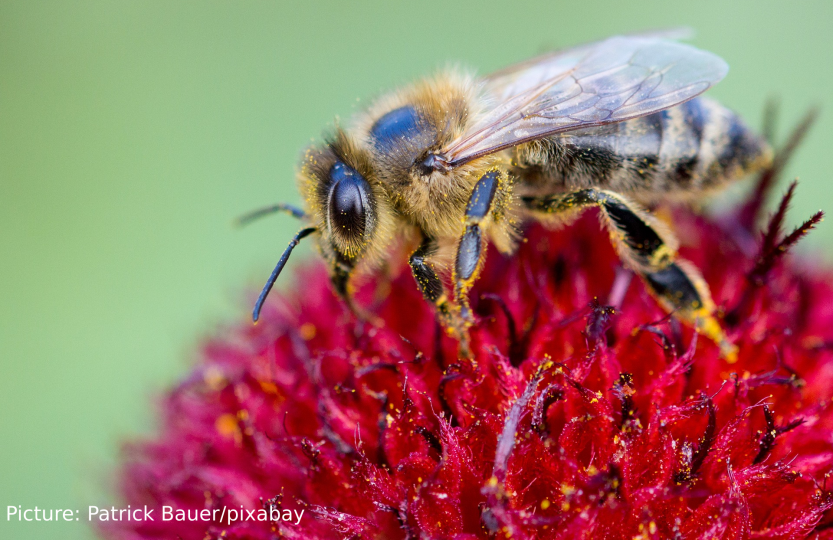Suddenly, you find yourself in a desert. It is a huge desert, dusty, hot, without anything to eat or drink. There is no store, nothing to provide you with food. You realize – if you cannot find anything very soon, you’ll starve. There! In the distance you can see a huge neon sign. With your last strength you drag yourself towards it. But then – the store is closed, nothing is there anymore. You stumble, wander around, search desperately for water. The dust, laying everywhere, makes you cough. Somehow, it seems to be toxic, in any case you are starting to lose the feeling in your arms. Your legs start to itch. You cannot remember where you are. You are lost. And you know, you will die.
What sounds like a scene from a bad horror movie is the everyday life of a bee. Pesticides are poisoning the bees searching for nectar, parasites are killing the larvae and the loss of flowers, unmown meadows and untouched green spaces is creating a desert-like world. Their number has decreased dramatically over the last few years and if the dying goes on, we – as humans – will face serious problems as well. Agriculture is heavily relying on the pollination services of bees. To replace them, e.g. with human pollinators or drones, will be immensely costly.
The EU has acknowledged the impact pesticides are having on bees; in 2013, they have already banned the use of so-called neonicotinoids on plants attracting bees. Yesterday, following a major report of the European Union’s scientific risk assessors (Efsa), the majority of the 28 member states has agreed to ban the use of three substances, namely Clothianidin, Imidacloprid and Thiamethoxam in open land. In greenhouses, they are still allowed. The report concluded that these substances are harming honeybees as well as wild bees, because the pesticides contaminate water and soils. Neonicotinoids are known to affect the nerve system of insects, causing paralysis, disorientation and reduce the capability of learning. The substances are therefore under suspicion to add to the dying of the bees. So, this is great news, right?
On the one hand, yes. But there is also a negative point.
The EU acknowledging the importance of bees (and insects generally) and the ban is a step in the right direction. But pesticides are only one part of the problem. Banning just three substances does not help much. Farmers with intensive agriculture are forced to use other chemical substances to maintain their yield. The industry is just waiting to sell their new generation of pesticides which will be harmful just as well.
And there is still more to it. Not only pesticides are threatening the wellbeing of bees. Monocultures and missing flower strips fail to provide bees with nectars. Asphalt roads and sealed areas leave no space for flowers or hedges. Over-fertilized soils are only suitable for daisies and dandelions.
Modern gardens with stones or sterile clipped lawn cannot contribute to the needs of bees. Flashy, overbred flowers act like neon signs for bees, but are often not able to produce nectar. Well-trimmed Thuja hedges and alien ornamental plants are adding nothing to the natural ecosystem.
What can you do?

Gardens can contribute significantly to biodiversity and an intact ecosystem. Don’t mow your lawn – it’s efficient and less work, really! Have a beautiful meadow with all kinds of flowers and enjoy the colourful view from spring to autumn. You will be rewarded with the most spectacular butterflies. Plant native species instead of ornamental plants and see how your garden comes to life. Hedgehogs, squirrels, and many birds and insects will be visiting.
You don’t have a garden? Plant some flowers on your balcony or on the windowsill. Find some unused spaces in your city or town and plant some flowers there. You can get seeds in your local garden centre. Join a local organisation. Become a beekeeper. The possibilities are endless…
But whatever you do, get started! The bees need our help now. Let’s plant flowers in the desert.









